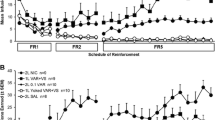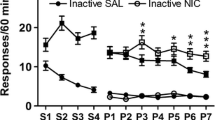Abstract
Background
The effectiveness of nonconsummatory reinforcers habituate, as their ability to maintain reinforced responding declines over repeated presentations. Preclinical research has shown that nicotine can delay habituation of reinforcer effectiveness, but this effect has not been directly demonstrated in humans.
Objective
In preliminary translational research, we assessed effects of nicotine from tobacco smoking (vs. a no smoking control) on within-session patterns of responding for a brief visual reinforcer.
Methods
Using a within-subjects design, 32 adult dependent smokers participated in two experimental sessions, varying by smoking condition: no smoking following overnight abstinence (verified by CO ≤ 10 ppm), or smoking of own cigarette without overnight abstinence. Adapted from preclinical studies, habituation of reinforcer effectiveness was assessed by determining the rate of decline in responding on a simple operant computer task for a visual reinforcer, available on a fixed ratio schedule.
Results
Reinforced responding and duration of responding were each significantly higher in the smoking vs. no smoking condition. The within-session rate of responding declined significantly more slowly during the smoking vs. no smoking condition, consistent with delayed habituation of reinforcer effectiveness. Follow-up analyses indicated that withdrawal relief did not influence the difference in responding between conditions, suggesting the patterns of responding reflected positive, but not negative, reinforcement.
Conclusions
These results are a preliminary demonstration in humans that smoked nicotine may attenuate habituation, thereby maintaining the effectiveness of a reinforcer over a longer period of access. Further research is needed to confirm habituation and rule out alternative causes of declines in within-session responding.

Similar content being viewed by others
References
American Psychiatric Association (2013) Diagnostic and statistical manual of mental disorders, 5th edn. American Psychiatric Publishing, Arlington
Benowitz NL, Iii PJ, Ahijevych K, Jarvis MJ, Hall S, LeHouezec J et al (2002) Biochemical verification of tobacco use and cessation. Nicotine Tob Res 4(2):149–159. https://doi.org/10.1080/14622200210123581
Bureau of Labor Statistics, U.S.Department of Labor (2015) Time spent in leisure activities in 2014, by gender, age, and educational attainment. The Economics Daily. https://www.bls.gov/opub/ted/2015/time-spent-in-leisure-activities-in-2014-by-gender-age-and-educational-attainment.htm
Caggiula AR, Donny EC, Palmatier MI, Liu X, Chaudhri N, Sved AF (2008) The role of nicotine in smoking: a dual-reinforcement model. In: Bevins RA, Caggiula AR (eds) The motivational impact of nicotine and its role in tobacco use. Springer, New York, pp 91–109. https://doi.org/10.1007/978-0-387-78748-0_6
Chaudhri N, Caggiula AR, Donny EC, Palmatier MI, Liu X, Sved AF (2006) Complex interactions between nicotine and nonpharmacological stimuli reveal multiple roles for nicotine in reinforcement. Psychopharmacology 184(3–4):353–366. https://doi.org/10.1007/s00213-005-0178-1
Deiches JF, Baker TB, Lanza S, Piper ME (2013) Early lapses in a cessation attempt: lapse contexts, cessation success, and predictors of early lapse. Nicotine Tob Res 15(11):1883–1891. https://doi.org/10.1093/ntr/ntt074
Donny EC, Chaudhri N, Caggiula AR, Evans-Martin FF, Booth S, Gharib MA et al (2003) Operant responding for a visual reinforcer in rats is enhanced by noncontingent nicotine: implications for nicotine self-administration and reinforcement. Psychopharmacology 169(1):68–76. https://doi.org/10.1007/s00213-003-1473-3
Gancarz AM, Ashrafioun L, San George MA, Hausknecht KA, Hawk LW Jr, Richards JB (2012) Exploratory studies in sensory reinforcement in male rats: effects of methamphetamine. Exp Clin Psychopharmacol 20(1):16–27. https://doi.org/10.1037/a0025701
Henningfield JE, Smith TT, Kleykamp BA, Fant RV, Donny EC (2016) Nicotine self-administration research: the legacy of Steven R. Goldberg and implications for regulation, health policy, and research. Psychopharmacology:1–20
Hughes JR (2007) Effects of abstinence from tobacco: valid symptoms and time course. Nicotine Tob Res 9:315–327. https://doi.org/10.1080/14622200701188919
Kenzer AL, Ghezzi PM, Fuller T (2013) Stimulus specificity and dishabituation of operant responding in humans. J Exp Anal Behav 100(1):61–78. https://doi.org/10.1002/jeab.29
Lloyd DR, Medina DJ, Hawk LW, Fosco WD, Richards JB (2014a) Habituation of reinforcer effectiveness. Front Integr Neurosci 7:1–20. https://doi.org/10.3389/fnint.2013.00107
Lloyd DR, Hausknecht KA, Richards JB (2014b) Nicotine and methamphetamine disrupt habituation of sensory reinforcer effectiveness in male rats. Exp Clin Psychopharmacol 22(2):166–175. https://doi.org/10.1037/a0034741
Ma CM, Shek DT (2014) How to plot growth curves based on SPSS output? Illustrations based on a study on adolescent development. Int J Disabil Hum Dev 13(2):183–190. https://doi.org/10.1515/ijdhd-2014-0304
McSweeney FK (1992) Rate of reinforcement and session duration as determinants of within-session patterns of responding. Anim Learn Behav 20(2):160–169. https://doi.org/10.3758/BF03200413
McSweeney FK (2004) Dynamic changes in reinforcer effectiveness: satiation and habituation have different implications for theory and practice. Behav Anal 27(2):171–188
McSweeney FK, Murphy ES (2009) Sensitization and habituation regulate reinforcer effectiveness. Neurobiol Learn Mem 92(2):189–198. https://doi.org/10.1016/j.nlm.2008.07.002
Norman WD, Jongerius JL (1985) Apple Picker: computer software for studying human responding on concurrent and multiple schedules. Behav Res Methods Instrum Comput 17(2):222–225. https://doi.org/10.3758/BF03214387
O’Dell LE, Khroyan TV (2009) Rodent models of nicotine reward: what do they tell us about tobacco abuse in humans? Pharmacol Biochem Behav 91(4):481–488. https://doi.org/10.1016/j.pbb.2008.12.011
Palmatier MI, O’Brien LC, Hall MJ (2012) The role of conditioning history and reinforcer strength in the reinforcement enhancing effects of nicotine in rats. Psychopharmacology 219(4):1119–1131. https://doi.org/10.1007/s00213-011-2439-5
Perkins KA, Karelitz JL (2013a) Reinforcement enhancing effects of nicotine via smoking. Psychopharmacology 228(3):479–486. https://doi.org/10.1007/s00213-013-3054-4
Perkins KA, Karelitz JL (2013b) Influence of reinforcer magnitude and nicotine amount on smoking’s acute reinforcement enhancing effects. Drug Alcohol Depend 133(1):167–171. https://doi.org/10.1016/j.drugalcdep.2013.05.016
Perkins KA, Karelitz JL (2014) Sensory reinforcement-enhancing effects of nicotine via smoking. Exp Clin Psychopharmacol 22(6):511–516. https://doi.org/10.1037/a0037823
Perkins KA, Karelitz JL, Michael VC (2015) Reinforcement enhancing effects of acute nicotine via electronic cigarettes. Drug Alcohol Depend 153:104–108. https://doi.org/10.1016/j.drugalcdep.2015.05.041
Perkins KA, Karelitz JL, Boldry MC (2017) Nicotine acutely enhances reinforcement from non-drug rewards in humans. Front Psychiatry 8. https://doi.org/10.3389/fpsyt.2017.00065
Rankin CH, Abrams T, Barry RJ, Bhatnagar S, Clayton DF, Colombo J et al (2009) Habituation revisited: an updated and revised description of the behavioral characteristics of habituation. Neurobiol Learn Mem 92(2):135–138. https://doi.org/10.1016/j.nlm.2008.09.012
Raudenbush SW, Bryk AS (2001) Hierarchical linear models: applications and data analysis methods. SAGE publications
Rupprecht LE, Smith TT, Schassburger RL, Buffalari DM, Sved AF, Donny EC (2015) Behavioral mechanisms underlying nicotine reinforcement. In: The neuropharmacology of nicotine dependence. Springer International Publishing, pp 19–53. https://doi.org/10.1007/978-3-319-13482-6_2
Shek DT, Ma C (2011) Longitudinal data analyses using linear mixed models in SPSS: concepts, procedures and illustrations. Sci World J 11:42–76. https://doi.org/10.1100/tsw.2011.2
Shek DT, Ma CM (2014) Application of SPSS linear mixed methods to adolescent development research: basic concepts and steps. Int J Disabil Hum Dev 13(2):169–182. https://doi.org/10.1515/ijdhd-2014-0303
Singer JD, Willett JB (2003) Applied longitudinal data analysis: modeling change and event occurrence. Oxford University Press
Thompson RF (2009) Habituation: a history. Neurobiol Learn Mem 92(2):127–134. https://doi.org/10.1016/j.nlm.2008.07.011
Van Gucht D, Van den Bergh O, Beckers T, Vansteenwegen D (2010) Smoking behavior in context: where and when do people smoke? J Behav Ther Exp Psychiatry 41(2):172–177. https://doi.org/10.1016/j.jbtep.2009.12.004
Wright JM, Ren S, Constantin A, Clarke PB (2018) Enhancement of a visual reinforcer by d-amphetamine and nicotine in adult rats: relation to habituation and food restriction. Psychopharmacology 235(3):803–814. https://doi.org/10.1007/s00213-017-4796-1
Funding
This research is based on a Master’s thesis conducted by JLK and presented at the 2017 meeting of the Society for Research on Nicotine and Tobacco in Florence, Italy. Research reported in this publication was supported by NIH Grants R01 DA035774 from NIDA (KAP) and T32 HL7560 (JLK). The content is solely the responsibility of the authors and does not necessarily represent the official views of the NIH.
Author information
Authors and Affiliations
Corresponding author
Ethics declarations
Conflict of interest
The authors declare that have conflict of interest.
Rights and permissions
About this article
Cite this article
Karelitz, J.L., Perkins, K.A. Tobacco smoking may delay habituation of reinforcer effectiveness in humans. Psychopharmacology 235, 2315–2321 (2018). https://doi.org/10.1007/s00213-018-4927-3
Received:
Accepted:
Published:
Issue Date:
DOI: https://doi.org/10.1007/s00213-018-4927-3




